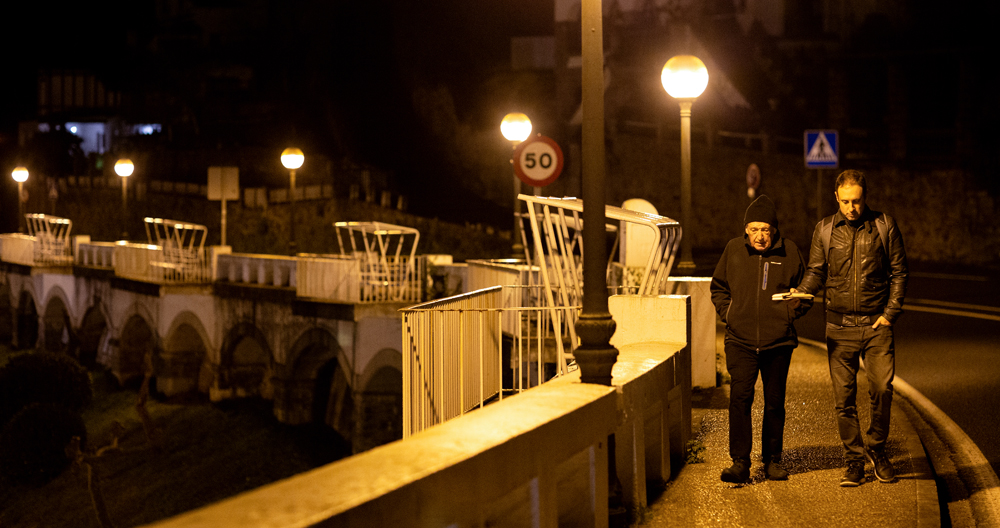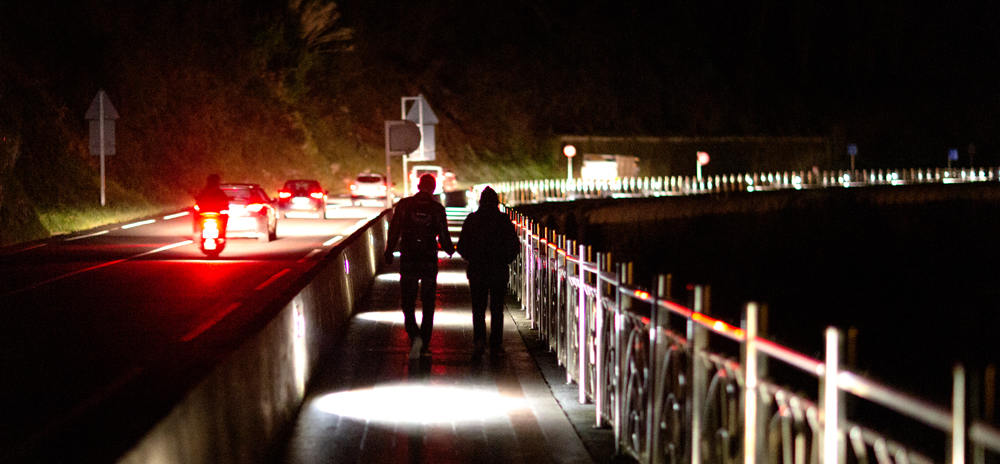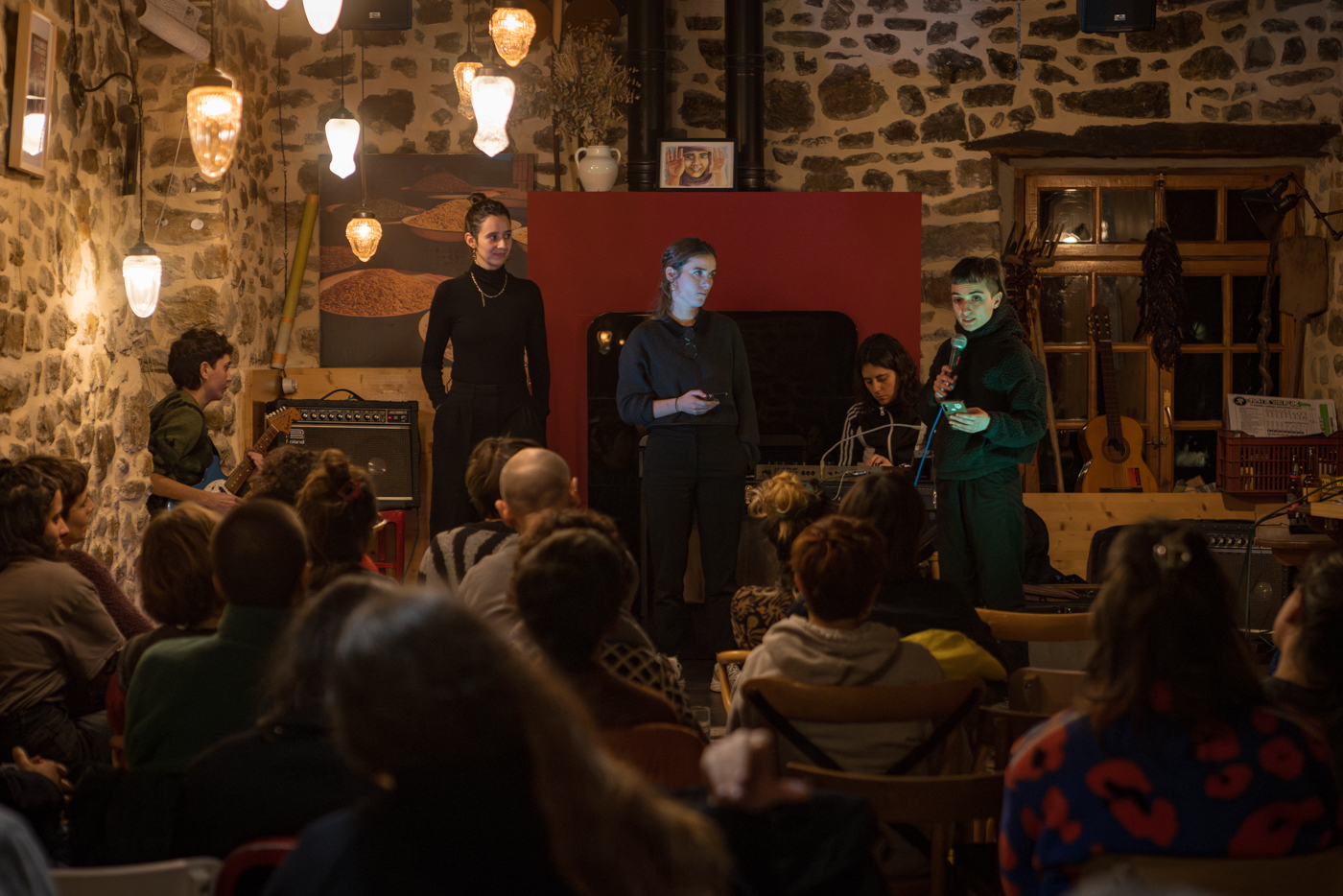"The doors open to clumsiness"
- The streets of Zarautz (Gipuzkoa) are empty. The people have a ghostly appearance in these hours. It's six and a half in the morning and it's cold. It's a gray January morning. The sea is alive, but not angry. You just hear it. Quickly and with the head covered in a black hat, we reached the height of the Palace of Narros, from the Malecon. It's still at night. But the words of Anjel Lertxundi (Orio, Gipuzkoa, 1948) will illuminate the road. The conversation tour has been divided into three parts. In general, we have talked about the influence of the passage from Zarauz to Getaria in its creation; but the rest of the borderline matter, such as the coral fish of the waves, always come to light.

We departed from the Palace of Narros. Space suitable for the location and context of a literary work.
Yes, the last part of the book Azkenaz beste (1996) is in the Narros Palace. The main character enters the sea, leaving the palace. You see a sailboat and we don't know if he's going there or if he's committing suicide.
Since when do you have a habit of walking every day?
It's been about 40 years since I got up very early and about 25 years since I started walking, but I've done it intermittently, because there are always other tasks. Or also because it's become lazy. The reason you walk so early every day is that once you have walked you have all day for you and, above all, gives a mental light. I've always gotten up very early. You'll have to look at the years I spent in the seminary, a discipline I've always kept. Even when I was a teacher at the teaching school, I always asked for first hour classes, by myself and by the students, who are the ones who most attend the first hours.
Getting up so early has little to do with the figure of the Bohemian writer, the tuner. But there's also a prototype of walking writer, Baudelaire, Walter Benjamin, Robert Walser, Vila-Matas...
Yes, there is a 19th-century walking or walking literature, the French flâneur. He had an intimate friend, the poet Claudio Rodríguez. He wasn't a travelling poet, because he wasn't physically fit to walk. It used to be in Zarautz, being him from Zamora. He said that many of his poems were starting to be born when walking. And he would walk the rhythm that poems would then have, the tempo. He ordered the poems according to the steps. I'm not a poet, but the running pace is also important for writing. If you go too fast, you will hardly be able to concentrate, if not on the same journey. But if you get ideas in your head, you also get tired of walking soon and catch another rhythm.
The walk itself implies a pause in time and thus an appropriation of the time that can benefit the creator.
Yes, I would distinguish, however, the walk from one side to the other. Walking is paying attention to everything around you. We are by the sea, and I see the sea, its sound, its waves, its strength… If there is traffic, it curses traffic, and only when you walk you look at the passage.

The sea constantly accompanies you on these daily walks. How does it affect you?
I have a commuter every day, but every day he has something new. Always the same, but always renovated. Every day is different. And that marks the beginning of the day: if it is strong, or very quiet… closer or further away. There are things that seem impossible to grasp, but that denote vitality. They express the vitality of nature.
Don't you bring music, radio artifacts, newspapers?
I've never been tempted to listen to one of these language learning programs. You know, languages are rust. I had abandoned French for a long time and had once put on my helmets and heard a recited novel -- but it wasn't a fruitful experience. Impossible! Either one or the other. And never music. Otherwise, I have a habit of listening to music, especially when I'm working, but not walking.
It's a pretty poetic act to walk today. You've never taken the step of writing poetry. Have you abandoned it forever?
I've written some loose poem, and I still do some essay, but not in a disciplined way. Well, poetry can't be written in a disciplined way, if not at the time of ending. Writing is very different from testing, at least for me. By the way I write I have been tempted more by poetry than by poetry itself. Probably because I don't know how to do poetry, although the things I wrote first were poetry, and also in Spanish. In the boys, I didn't have the literate Basque, like all of our generations. The decision to write in Basque came later. In the one who spoke in Spanish I felt my poetic voice, but I have not felt it in Basque, I have not found it. I have not achieved that security.
And what do you attribute that to?
No trace. Aesthetic pleasure is not carried out in the same way in the internal circuits of oneself, and language is not carried out in the same way in function of one's own experience.
Have you definitively abandoned poetry?
No, I'm not biased, but I would need a lot of security, feeling my legs in a slightly secure land; when you've gone a long way, you wouldn't want to do anything more than you've put yourself in.
If you're a poetry reader. How does the new Basque poetics see?
I don't follow poetry as much as I do the narrative, and I find it hard to give a general answer, but I would say that I'm reading some very interesting things in recent years. And, above all, I read with pleasure the poetry that women have done; I don't like too much to distinguish what women and men have done in poetry and literature, but if you see a constant in poetry, in expressive force and in the treatment of many issues, which are a novelty, because the authors who have drawn your attention are women, you say: “Here’s something.” From there I am not able to theorize, but that would highlight it.
For many years, you wrote a column every day in Berria. Did you also walk around then?
I usually liked to lie down without knowing what I'd write the next day. She's tired, but she helped me stay tuned to day by day. You keep your head alive. That's why I'd never kept anything in the refrigerator, except four or five days when I was leaving. Yes, I would walk and the daily walk helped me to refresh my ideas. Nothing so unpleasant had ever happened to me.
Do you now lack the daily column?
I still often keep making columns. Fourteen years of work are not lost at all. Sometimes I think and think: “Kaben zotz, it hurts that he hasn’t written the column.” I had some temptation… but the time passed. I am happy with the work done and now I am at a different pace. I write and write occasional questions, and it's curious, because that every month gives me almost more work than every day.

From this new watchtower, how do you see the evolution of Basque journalism? You say in the book that they're not good times for detail. Can journalism be anything without nuances?
The doors open, without nuances, to clumsiness. The differences are noticeable in the nuances, but the nuance gives work. For example, it is known that in Africa there are more aircraft accidents than in Europe or the West, but what you do not know is what is behind that, economic conditions, etc., nuances.
Beyond journalism, does this lack of nuances not also facilitate current trends for totalitarianism?
For a totalitarian, the enemy is a nuance. He is not interested in getting into nuances at all. Totalitarianism uses manipulation to bring people to their mill, and the nuance is just the opposite of manipulation. When there are no nuances there is nothing complete, in the nuances is the secret of the whole and of life.
Is there also a lack of nuances in the world of Basque culture?
These are times when this is always spread. We have talked about totalitarianism and it is not happening in one place; it is happening in Asia, it is happening in South America, it is happening to us in Europe… it is difficult for us not to touch that. They are seeking political and cultural effectiveness, but short-term effectiveness. This effectiveness leaves a lot of people behind. So they trick a lot of people. Long-term work is more related to detail, nuance, and not to effectual manipulations. The same is true of personal life, art, cinema, literature…
Without nuances there can hardly be signs of humanism. Today, almost no one claims the concept of humanism, you are one of the few who mention it.
It's because I'm a demode. As I understand it, humanism is a principle or a philosophy that governs and governs Europe, such as Buddhism in the East. The one that puts the force on the human being. Look at what has happened recently in Bolivia through religion. In all of them there is no trace of humanism. There is talk of humanism as a matter of yesteryear, “it was a quiet time, and then it was.” But both then and now we are in the midst of the wars of religions. It would not then be so easy to apply humanism, in the midst of the devastating Christianity, etc., but now it is also costing us a great deal.
However, those who do not speak of religions, even the majority of those who do so from a transformative point of view, hardly mention humanism as a value.
Because, in a way, the spirit of war has prevailed, in a broad sense, in many movements and attitudes. That spirit is the only one who confines himself to winning. I won my ground, I won my cause, I won my speeches. The same thing happened to humanism, which was left out because it did not fit into the schemes of the banderizes, either of them or of others. It's annoying. Zubigintza is always difficult, and by the way also the translation [laughter].
Astelehen honetan hasita, astebetez, Jon Miranderen obra izango dute aztergai: besteren artean, Mirande nor zen argitzeaz eta errepasatzeaz gain, bere figurarekin zer egin hausnartuko dute, polemikoak baitira bere hainbat adierazpen eta testu.
Martxoaren 17an hasi eta hila bukatu bitartean, Literatura Plazara jaialdia egingo da Oiartzunen. Hirugarren urtez antolatu du egitasmoa 1545 argitaletxeak, bigarrenez bi asteko formatuan. "Literaturak plaza hartzea nahi dugu, partekatzen dugun zaletasuna ageri-agerian... [+]
1984an ‘Bizitza Nola Badoan’ lehen poema liburua (Maiatz) argitaratu zuenetik hainbat poema-liburu, narrazio eta eleberri argitaratu ditu Itxaro Borda idazleak. 2024an argitaratu zuen azken lana, ‘Itzalen tektonika’ (SUSA), eta egunero zutabea idazten du... [+]



















ilbeltza-(1).jpg)